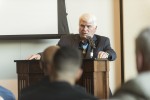James McCloughan was the shortest in his troop when he served in the Vietnam War, but he never let that make him feel inferior to anyone else.
McCloughan received the Medal of Honor from President Donald Trump in July for his valor in saving the lives of 10 members of his platoon at the Battle of Nui Yon Hill in May 1969. At an event at the UCLA Meyer and Renee Luskin Conference Center on Tuesday attended by about 50 students, faculty and military personnel, McCloughan said the war taught him the importance of trusting his teammates.
Major Bill Ritch, an assistant professor of military science, said the department invited McCloughan to speak at UCLA because of his experiences as a coach and teacher after the Vietnam War. He added that McCloughan is the second Medal of Honor recipient the department has invited to campus.
McCloughan said he was willing to fight in the Vietnam War when he was drafted at the age of 22 because his father was a World War II veteran, but he added he thinks Vietnam War veterans are not praised as much as World War II veterans because of the war’s unpopularity.
“We are the same warriors who fought in different wars,” he said. “Ninety-eight percent of Vietnam veterans were honorably discharged. … That is the biggest thing that I can think of to explain the character of people that fought in the war.”
McCloughan added his faith helped him get through the war.
“I got shot in the arm while I was putting bandages on a wounded man, and I was considering how I was going to carry him out to a safe place when I asked the Lord to get me out of there,” he said. “All of a sudden this incredible peace came over me – I scooped that man up and carried him to a safe place.”
This man was one of the 10 men McCloughan saved during his time in Vietnam. Five of the men he saved attended his Medal of Honor ceremony at the White House in July.
“The greatest moment of my life was when President Trump asked them to stand up and receive their clap,” McCloughan said.
After serving in Vietnam, McCloughan taught high school sociology and psychology and coached football, wrestling and baseball. He said he used his experience from the war to inspire his students.
“Everyone in this room will have their own Vietnam, whether it is moving away from your hometown, someone close to you dying or your house burning down,” McCloughan said. “As a teacher and a coach I want to prepare my students for when they are being shot at.”
Calvin Childress, a student cadet in the department of military science, said he attended the event to learn from McCloughan and thank him for his service. He added he thinks it was an honor to hear McCloughan speak.
“Hearing from people that have gotten through things like that and still have come out on the other end and been successful in life is very empowering,” he said.

Without questioning the patriotism of people like McCloughan, many of us Vets are discussing the lessons we should have learned but didn’t. Medals should not hide our shame. This is an adaptation of part of that discussion.